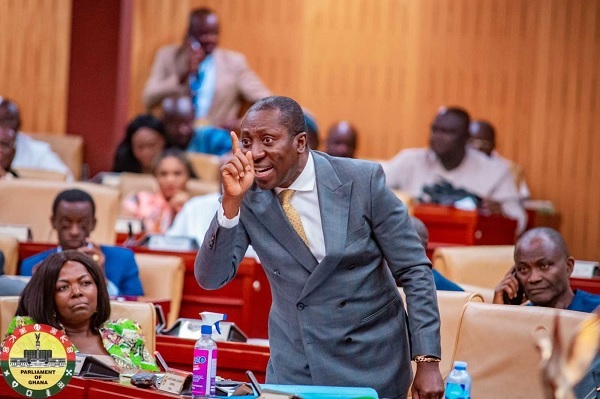The Minority Leader in Parliament, Alexander Afenyo-Markin, has called on Ghana’s two dominant political parties—the National Democratic Congress (NDC) and the New Patriotic Party (NPP)—to end the entrenched cycle of political retaliation, warning that it is undermining democratic stability and eroding public trust.
Speaking on Joy FM’s Super Morning Show on Friday, May 2, 2025, the Effutu MP described the decades-long practice of political vengeance as a “vicious cycle” that yields no meaningful progress for the nation.
“All we have as a country is our democracy,” he said. “Since 1992, we’ve witnessed cycles of retaliation in governance. But I believe the time has come for us to look beyond that and focus on legacies that safeguard our democratic future.”
Mr Afenyo-Markin’s remarks come amid concerns over partisan interference in public institutions, including the judiciary and state-owned enterprises. He accused both the NDC and NPP of fostering a political culture in which each transition of power triggers mass dismissals, institutional purges, and politically motivated vendettas.
“If we continue this approach, it means we are entering a vicious cycle without end,” he cautioned. “Where would it lead us to? The NDC may think they are enjoying this moment, but they are eroding themselves too.”
Falling public confidence
Highlighting growing voter apathy as a sign of deepening public disillusionment, the Minority Leader pointed to the 2020 general elections as a warning sign. He noted that voter turnout in traditional strongholds, including Greater Accra, fell significantly.
“Look at the turnout in Greater Accra—just above 53%. Even in the NPP’s strongholds, the numbers are falling. This shows there’s a disconnect. People are tired of the same old politics,” he observed.
Politicisation of judiciary and public sector
Mr Afenyo-Markin also criticised what he described as the politicisation of the judiciary, citing the recent suspension process targeting the Chief Justice. He argued that the petition filed lacked merit and should not have been entertained by the Council of State.
“If you look at the petition, it wouldn’t even qualify for consideration by any educated body,” he said. “And yet, the Council of State—almost unanimously—found a prima facie case. That’s where the disappointment comes from.”
He further raised concerns over dismissals in public institutions, claiming that qualified individuals were being removed solely based on perceived political affiliations.
“People who have worked for seven, eight years are being sacked overnight,” he said. “This is not limited to the civil service but includes SOEs like the Maritime Authority and Ghana Water. This is dangerous for our democracy.”
A call for political maturity
Mr Afenyo-Markin urged both parties to reflect on their time in office and prioritise the national interest over partisan gains. He called for a more mature, reconciliatory approach to governance, grounded in meritocracy and collaboration.
“We’ve seen NDC 1, 2, 3. We’ve seen NPP 1 and 2. What have we really done as a political class to help this nation?” he asked. “We must learn from the past and do better.”
He warned that if political actors fail to rise above vendetta-driven governance, Ghana risks losing the very foundation of its democracy.
“Let’s not forget—when we lose the people’s trust, we risk losing the democracy itself,” he added.

